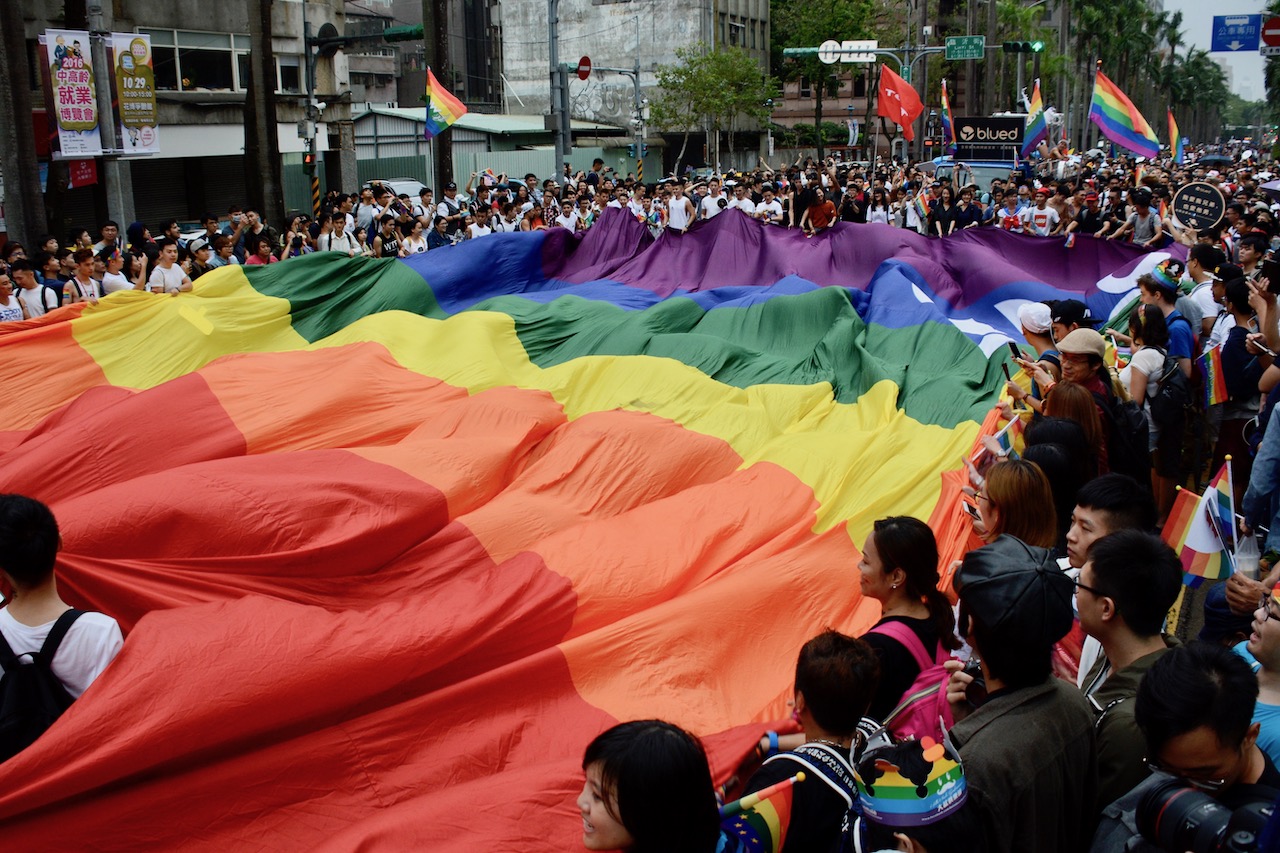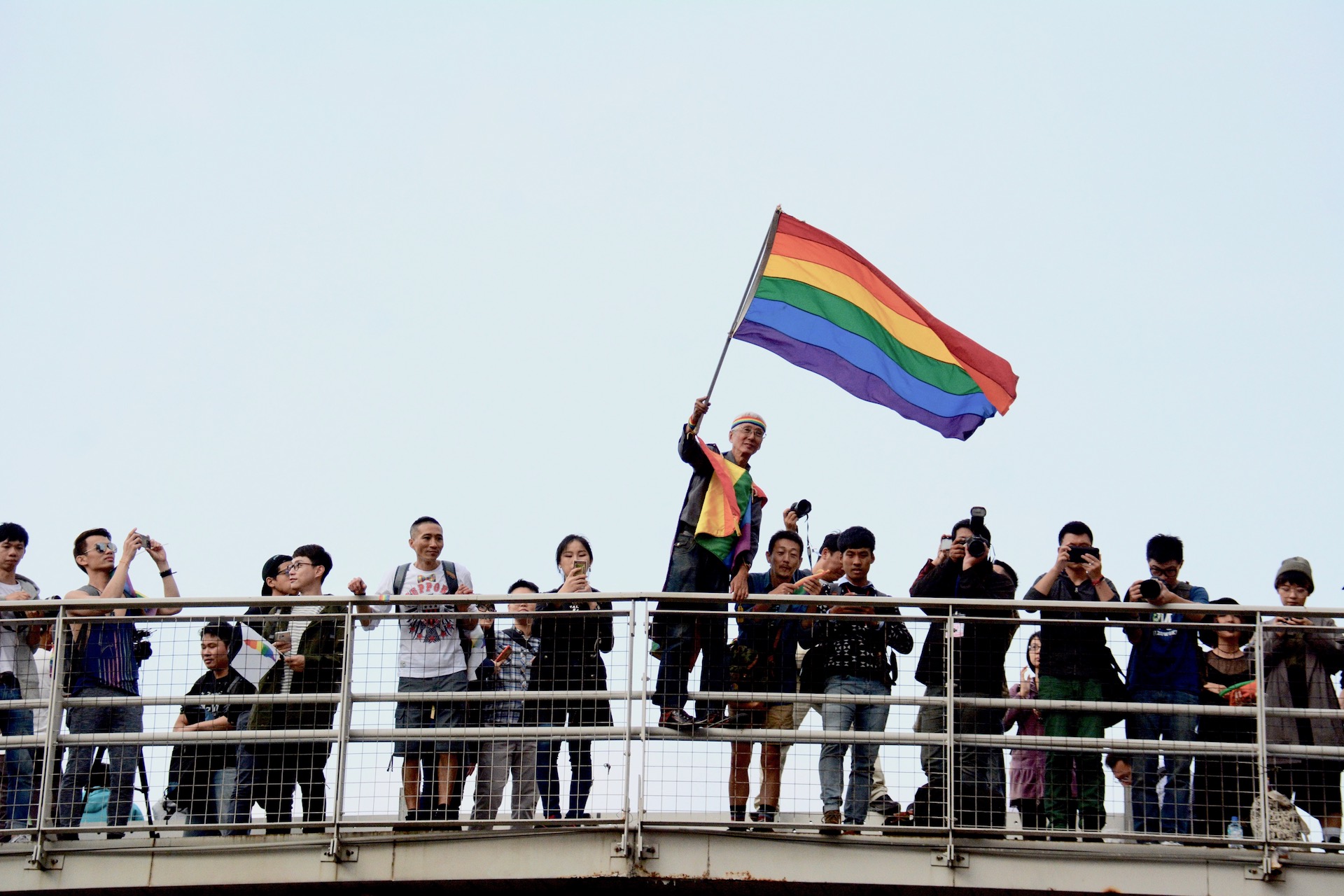Public opinion trends and campaigning by conservative groups raise question marks about Taiwan’s reputation as one of the most liberal countries in Asia.
Imagine this scenario: A group of bankers occupies the Legislative Yuan debating chamber, shouting the slogan “Protect Democracy, Decriminalize Adultery!” (捍衛民主, 通姦除罪). This may sound like a ridiculous scenario completely detached from the reality of Taiwanese politics. However, I was once told how, when one of Taiwan’s social movement-linked parties reached out to a group of bankers for donations, they were told that they disagreed with all their policy ideas — except decriminalizing adultery.
Taiwan has developed an international reputation as one of the most liberal countries in Asia. It has a vibrant multi-party system and is ranked as one of the freest liberal democracies by organizations such as Freedom House. Its strong civil society is perceived as a key component of Taiwan’s democracy. The ability, for instance, of the Sunflower Movement to change core government policy on relations with China or the anti Nuclear Movement’s long-term campaign to phase out nuclear power are inspirational stories for many overseas activists. Similarly, the campaign to make Taiwan the first Asian country to legalize same-sex marriage and having the largest gay pride parade in Asia have also reinforced the country’s liberal and tolerant reputation.
Nevertheless, when we examine public opinion trends as well as the campaigning of conservative anti-LGBT rights groups, question marks can be raised on Taiwan’s liberal international image.
One such issue area concerns adultery. Here Taiwan looks like an anomaly. Following decriminalization in the supposedly more conservative South Korea in 2015, Taiwan is one of the few counties in the world that still treats adultery as a criminal offense. Although this is meant to protect the family (wives in particular), statistics show that women are much more likely to be the victims of adultery court rulings. Feminist groups such as the Awakening Foundation have long called for decriminalization, as have individual politicians and even Taiwan’s former Minister of Culture Lung Ying-tai. International human rights reports on Taiwan have also cited this as an issue of concern. However, public opinion appears strongly opposed to decriminalization, with surveys tending to find 75-85 percent against reform. At times, the Ministry of Justice has proposed decriminalization but has had to shelve reform in the face of widespread public opposition, especially from women. Despite long-term campaigning for decriminalization by civil society groups, public opinion appears as intolerant as ever. It will be interesting to see whether this issue will be reviewed by Taiwan’s Constitutional Court in the same way as same-sex marriage in the future.
There has clearly been remarkable progress in changing public opinion on a range of social issues over the last decade, and Taiwan’s civil society advocacy has played a key facilitating role in such changes. However, it is clear that much more work needs to be done by civil society to persuade Taiwanese society on all three issues.
We see a very similar pattern when it comes to the death penalty. There has been much more international pressure on Taiwan on this issue, for instance from the European Union. Civil society groups such as the Taiwan Alliance to End the Death Penalty have tirelessly campaigned for change. During Chen Shui-bian’s presidency it was announced that the government intended to abolish the death sentence and for the second half there was a moratorium on executions. However, despite international condemnation, executions were resumed in Ma Ying-jeou’s presidency and the first has occurred under Tsai Ing-wen. One factor in the lack of change is that public opinion appears to still strongly back the death penalty. Therefore politicians are generally wary of openly calling for abolition. In fact, the smaller parties such as the Green Party Taiwan and the New Power Party have often been attacked by conservative groups or Kuomintang (KMT) politicians for their stances on this issue. Consequently, they too have had to tread carefully on how they speak about the death penalty.
The issue of same-sex marriage and LGBT rights had been quite marginal in Taiwanese political circles for much of the post martial law era. It only began to rise in salience after 2000 as a result of advocacy from civil society groups, alternative parties such as the Green Party, and some individual DPP politicians. President Tsai’s public support for same-sex marriage in the 2016 presidential campaign was a milestone, as she was by then on the verge of gaining national power. Nevertheless, the Tsai administration has not been able to push through legislation, leading to widespread impatience from many former supporters in civil society. Although the Constitutional Court ruled in May 2017 in favor of same-sex marriage, the DPP government did not follow up decisively despite its parliamentary majority. Public opinion polls have tended to show a small majority in favor of same-sex marriage, and that support is especially strong among younger respondents. However, we have seen a very strong conservative countermovement that has run well-funded campaigns, such as during the 2016 election and the recall campaign against the pro-LGBT rights legislator Huang Kuo-chang in 2017. The conservative groups have continued their campaign in the form of referendum drives in 2018 and appear to have achieved high levels of mobilization and to have been receiving significant support from certain political parties. Although we often associate social media campaigning with Taiwan’s progressive social movements, the anti-LGBT movement has embraced platform such as Line to spread its conservative messages. In contrast, the LGBT rights groups appear under-resourced and also struggling to mobilize as effectively outside the main urban centers. To the disappointment of many in civil society, the DPP has not taken an active role in following up on Tsai’s 2016 pledge in this current referendum campaign.
A common feature for all three issues is that Taiwan would receive significant international recognition and support by engaging in liberalizing reforms. The international reaction to the May 2017 Constitutional Court ruling reveals the soft power potential such a development can bring Taiwan. Nevertheless, the solution to these dilemmas lies within Taiwan.
Back in 2006 I co-wrote a book chapter with Weng Hui-chen titled “The Rootless Movement: Taiwan’s Women’s Movement.” In it, we argued that despite the remarkable success of Taiwan’s feminist movement in pushing legal reforms, it remained too elitist and its grassroots weakness undermined its ability to spread its message in mainstream society. There has clearly been remarkable progress in changing public opinion on a range of social issues over the last decade, and Taiwan’s civil society advocacy has played a key facilitating role in such changes. However, it is clear that much more work needs to be done by civil society to persuade Taiwanese society on all three issues.
Civil society activism alone though will not be enough. Change will require action from political society. On all three issues political leadership could promote liberalizing reforms that would bring Taiwan significant international praise and allow government to regain some trust in civil society. Naturally there is strong public opposition on some of these issues, but this was also the case in the UK. Even after the abolition of the death penalty in the UK, surveys often showed majority support for its reintroduction, but subsequent parliamentary votes consistently rejected this. In the UK we also saw how LGBT rights actually became a consensual cross-party issue, and it was eventually a Conservative Party government that introduced same-sex marriage legislation. With the DPP taking an ambiguous wait-and-see position on controversial social issues, embracing policies such as same-sex marriage and decriminalizing adultery might be a perfect modernizing strategy for the KMT to reach out to both young voters and the banker types. Or is this as unlikely as the scenario I started this essay with?
You might also like
More from Society & Culture
Media and Free Expression in Taiwan Are Under Attack: What Can be Done?
How can we avoid the imposition of a blanket silence which can only empower our enemies and damage our democracy? …
Taiwanese Views on Homosexuality Based on Proximity of Relationship, Study Shows
The legalization of same-sex marriage in Taiwan should be viewed not just as a culmination of years of advocacy efforts …
Challenges Remain Following the Legalization of Same Sex Marriage in Taiwan
Despite the adoption of a new law on May 17, campaigns will continue to legitimize the kind of homophobic discourse …









